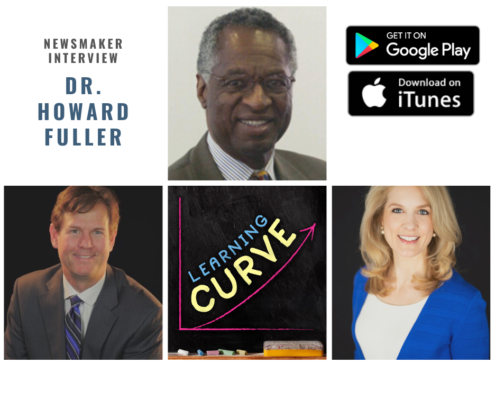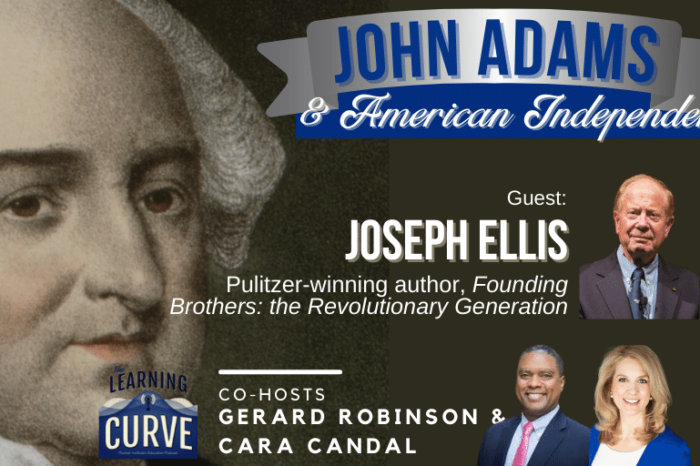Mt. Holyoke’s Pulitzer-Winning Prof. Joseph Ellis on John Adams & American Independence
/in Featured, Podcast, US History /by Editorial StaffThis Fourth of July week on “The Learning Curve,” co-hosts Gerard Robinson and Cara Candal talk with Dr. Joseph Ellis, Professor Emeritus of History at Mount Holyoke College and author of the Pulitzer Prize-winning book, Founding Brothers: The Revolutionary Generation. They discuss the resurgence of public interest in the Revolutionary and Founding generations due, in part, to his book, Passionate Sage: The Character and Legacy of John Adams. Known as the “Atlas of American Independence,” John Adams was perhaps the best educated among the Founding generation. Ellis describes his deep knowledge of classical liberal arts and Enlightenment subjects, including ancient history, political philosophy, and the law, and how it equipped him for intellectual and political leadership. They review Adams’ key experiences and character traits, as the major author of the 1780 Massachusetts Constitution, which served as a model for the U.S. Constitution; his ardent opposition to slavery; and his critical eye for spotting political talent. Lastly, they explore the relationship between Adams and his beloved, talented wife, Abigail; as well as their gifted son, John Quincy Adams, the sixth U.S. President; and the family’s remarkable dedication to public service. Prof. Ellis concludes the interview with a reading about John Adams and American Independence.
Stories of the Week: In Mississippi, public K-12 students have made greater gains than in any other state, becoming a national model for both practitioners and policymakers alike, as a result of specific reforms implemented by State Superintendent of Education Carey Wright. At least 12 states are relaxing teacher certification rules, including licensure, to address the labor shortage.
Guest:

Joseph Ellis is Professor Emeritus of History at Mount Holyoke College and among the nation’s leading scholars of American history. The author of eleven books, Ellis was awarded the Pulitzer Prize for Founding Brothers: The Revolutionary Generation and won the National Book Award for American Sphinx: The Character of Thomas Jefferson. His in-depth chronicle of the life of our first President, His Excellency: George Washington, was a New York Times bestseller. Ellis’ most recent book, The Cause: The American Revolution and Its Discontents, was published in Fall 2021. Professor Ellis’ essays and book reviews appear regularly in national publications, such as The New York Times, The Los Angeles Times, The Wall Street Journal, The Chicago Tribune, The New Republic, and The New Yorker. Ellis’ commentaries have been featured on CBS, C-SPAN, CNN, and PBS’s The News Hour with Jim Lehrer, and he has appeared in several PBS documentaries on early America, including John and Abigail [Adams] for PBS’s The American Experience and a History Channel documentary on George Washington. He received his A.B. from the College of William and Mary, and earned his M.A. and Ph.D. from Yale University.
The next episode will air on Weds., July 13th, with Jean Strouse, author of the award-winning biography of J.P. Morgan, Morgan: American Financier.
Tweet of the Week:
The Hawaii Space Grant Consortium, a community educational program supported by @NASA, has partnered with schools across the state to implement robotics in the classroom. #EdChathttps://t.co/UGOKp093EJ
— Education Week (@educationweek) June 30, 2022
News Links:
States Relax Teacher Certification Rules to Combat Shortages
“How’d You Do It?” Mississippi’s Superintendent of Education Explains State’s Learning Gains
Get new episodes of The Learning Curve in your inbox!
Read a Transcript of This Episode
Please excuse typos.
[00:00:00] GR: Hello listeners. Welcome back to another wonderful episode of The Learning Curve. I want to say hello to my 4th of July colleague, Cara, who I’m sure had some really good things she was able to do over the July. Fourth holiday weekend. Ours was less eventful than we expected. family hap.
[00:00:41] Last minute change. And so we had to switch our plans, but with that being said I still take time to celebrate the fourth. I understand all the dynamics racial, cultural, cultural, gender, everything else that goes into it. And I do not say that , but I do at least enjoy the fact that we [00:01:00] still live in a country where we have some freedoms that people in other parts of the world cannot.
[00:01:04] Celebrate. So for me, I enjoyed the day, but didn’t get enough barbecue or school time,
[00:01:11] GR: other things
[00:01:13] Cara: oh, that’s good to hear your voice, Gerard. Yeah, actually we had sort of last minute plan change too. We usually spent the fourth with some good friends of ours and just been a lot of travel in our lives lately.
[00:01:23] So we decided to stay local. And it’s interesting that you talk about how important it is to celebrate the fourth. So we actually, we took our kids to a red Sox game and I am shh, not a baseball fan. It’s not like, not something I used. I, I I’ve heard. Yeah. It’s like I had to ask my husband how many, how many innings, how many innings, but a really interesting part of this was Well, first of all, I, don’t listen to the news on weekends much because I like to have sort of my brain free.
[00:01:51] But as many of our listeners know yet another mass shooting in the United States this time on the 4th of July interestingly, I don’t talk to my kids about these things [00:02:00] until we’re in sort of a safer place. But my daughter, my 12 year old daughter, when I asked her, we were all wearing hats, baseball hats, because it’s very hot out.
[00:02:07] And I said, please, you know, take off your. For the national Anthem and Stan, my daughter asked me really seriously things aren’t really good in this country right now. Why should we be, why should we be singing about it? And I said, well, to your point, Gerard, there are a lot of good things still about this country, but boy, oh boy.
[00:02:24] Yep. We’ve got a lot of work to do. And so my kids will be. making their own choices when they’re older about how they wanna handle things. But for now, I, agree with you. We have to especially thinking about those who’ve served. in wars, I know my own grandfather was a world war II vet.
[00:02:38] Many of us have veterans in our lives and it’s just an important day around. We did have a little bit of barbecue, Gerard, not much. tend toward the salad these days, but I wanted to just point out for our listeners before we get into our stories of the. That there’s a pretty good article out recently in the Atlantic by none other than Mitt Romney.
[00:02:56] So Senator from Utah, former governor of [00:03:00] Massachusetts, I know that surprises many people former governor of Massachusetts and former presidential candidate. And I just, Gerard, if you haven’t seen this one, I would highly recommend it to folks. It is called America. Is in denial. And what Senator Romney talks about here is the idea that, you know, we are in many ways, this country’s in the midst.
[00:03:23] Not one, not two but many crises. And nobody’s talking to one another and we’re hunkered down. We talk about this a lot. We’re hunkered down in our own little corners, blaming the other side for problems that are of everybody’s making. interestingly he, quotes here. He says, he’s reminded of the old adage that for evil to thrive only requires good men to do nothing.
[00:03:43] So I was reading that this morning, Jordan, and it was really sticking with me a lot. Especially as we think about. Really important holiday for our country, but the fact that it’s been an increasingly tough couple of years, so not to get too, too depressing here, [00:04:00] but I think that it’s an important holiday to reflect upon as well as just to celebrate with fireworks and heart clogging foods.
[00:04:07] So that’s my take. I, do have another less depressing story of the week. I actually have a happy story of the week chart but I know, I know you’ve got some good stuff
[00:04:16] GR: You wanna kick us off or do you want me to go first? Yeah, no. And by the way, I found the MI Roney article. I will check it out.
[00:04:23] I’ve been a, fan of his work and people also forget he’s a founder of Bain, so he’s. Yeah. Also an entrepreneur. So I would check
[00:04:30] Cara: this out. Yeah. And just an all around really smart guy and a leader, I would say. Okay. So here’s my, here’s my happy story of the week. It’s bittersweet actually, because this is about Mississippi and somebody, I believe that, you know, Dr.
[00:04:43] Carrie Wright, who has been state chief in Mississippi for almost. Decade, Gerard let that marinate for a minute. Almost a decade. This woman has been leading the state of Mississippi’s education system and she’s leaving. and the, title of this article, this is from ed next. It’s by, it’s an interview with [00:05:00] Robert PIO and it’s entitled how’d you do it.
[00:05:02] Mississippi’s superintendent of education explains state learning gains. Now we’ve talked about Mississippi on this show before they have gone from much like Florida did right before it. Interestingly, they’ve adopted many of the same reforms, but they have gone from being dead last in the nation on a number of measures.
[00:05:19] But boy, oh boy, especially on reading to really showing dramatic gains in the next couple years. I know I am personally watching to see, I don’t think anybody has super high expectations for the next round of nap scores, nor does anybody think that they’re gonna be maybe a reliable indicator Of what kids know, given everything that we’ve been through in the past couple years, but I will be really interested to see the extent to which Mississippi’s results.
[00:05:44] Keep sort of a pace and or if there’s less slippage in some of these states where we’ve seen meaningful growth in past decade than in other states, but to get to Dr. Wright and her pretty amazing tenure, you know, PIO asks her a really, I think, great set of questions.
[00:05:59] And he [00:06:00] asks her questions that have everything to do with like, you know, how is it that you. Got kids reading well answer. They passed an early literacy law, which means that in Mississippi kids are learning in a curriculum that is based in gasp the science of reading because yes, we actually do know that there’s a science based way.
[00:06:18] a proven way to teach kids to read. And it relies on phonics, which is out of Vogue in some circles since remains out of Vogue in some circles. I know it was out of Vogue when I was a kid and my mom taught me anyway. She was always appalled. That our schools were not teaching phonics. But there were some controversial steps too, that they did with the reading program.
[00:06:34] And that is when kids in Mississippi, aren’t reading on grade level by grade three, with some exceptions, they will repeat grade. And it’s called, it’s not a punishment it’s retention because we have really great data to show that if kids aren’t reading on grade level by grade three, man, the outcomes are not.
[00:06:51] it’s a really important sort of milestone for children. So that’s, that’s one of the things that Mississippi did, but I think that [00:07:00] the way I would like the way I would just look large, talk about what Dr. Wright says she did. She just and I’m sure you know, her Gerard. She’s quite frankly, prep, maybe one of the last of what I would call the old school reformers.
[00:07:12] She believes in the kinds of things that are now going out of Vogue, but that really helped. They certainly here in Massachusetts and in many other states helped kids make gains, helped move the needle just a little bit for kids in some states. And that’s sort of this mix of. Actual accountability.
[00:07:28] What I like to call like a mix between support and accountability. So accountability, not just the hammer, that, oh, you’re doing badly there are all these myths out there that under no child left behind, right. When schools didn’t perform money was taken away. Not true, but that when we shine a light on schools that aren’t serving kids well, that we need to go in and give folks the right support.
[00:07:49] One example in Mississippi would be reading coaches everywhere, man, to get kids to read, not only were they teaching in the science of reading, not only were they helping kids to read on grade level by grade three, but [00:08:00] they equipped their districts with reading coaches, reading coaches, reading coaches, all of them highly trained.
[00:08:05] And so that’s part of what helped Mississippi realized gains both in reading and, in math though, reading is really their success story. And Dr. Wright talks in this article about just the importance of data. Like actually using data. And, you know, especially in the past couple years, I fear that we’re in a place where, well, the data aren’t reliable and the data aren’t gonna tell us the data is still the data they’re gonna tell us something.
[00:08:28] Yeah. They might tell us a lot of stuff that we don’t wanna hear, especially post pandemic, but I’ll tell you what places like Mississippi and Florida. Decades ago before they really saw a great increase in NAPE scores. They were seeing a lot of data that they really didn’t wanna see. So it’s about confronting that data.
[00:08:45] The other thing that strikes me about Dr Wright’s tenure that really comes out in this article is that, let me repeat. This woman has served the state of Mississippi for almost a decade. That is, you know, Gerard you’re a state [00:09:00] chief and state chief you’re formative two states, right. State chiefs.
[00:09:03] It’s often a political position sometimes. You’re gonna be out based on who’s in office and Punic asks her in the article, did it help that you really Mississippi right as just, it’s a, it’s kind of a one party state as much as Massachusetts is dominated by the democratic party, Mississippi tends to be very Republican.
[00:09:21] And he asked her, like, did that just always get people on board with what you wanted to do? Could you pass any legislation you wanted? And she said, absolutely not. Let’s not assume that that just because somebody votes a certain way, that they’re gonna really prioritize the things that I need them to prioritize.
[00:09:35] But I think that for me, the thing about her tenure that sticks out is a consistent approach over time. So a decade of saying. We’re gonna teach kids to read in this way. We’re gonna make sure that kids can read this way. By third grade, we’re gonna shine a light on underperforming schools and go in and support them.
[00:09:54] That consistency. We saw it to some extent in Florida, we have seen it in [00:10:00] Mississippi. , we see it in two few places these days, Gerard. And so I think we can only hope. That Mississippi and the great staff that Dr. Wright has cultivated will find a way to sort of, carry out the reforms that she has put in place and not, move incrementally forward, but not reverse pace and what we know works.
[00:10:22] And I dare say, That if some other states, the one I’m sitting in too would, would, have an approach that is less political and about policy churn. And one that’s really focused on consistently trying and seeing what works and then only double backing when it’s clear that something doesn’t work that that’s the way to go for kids because she’s served now an entire generation of kids and they’re better for it.
[00:10:44] So, you know, Dr. Wright, Gerard, what are your thoughts?
[00:10:48] GR: Well, first of all, let me congratulate her on. Graceful exit from that position it is a position where some state chiefs do not exit with grace. Some are pushed out, pulled [00:11:00] out, some are, , dragged through the media mud. And she didn’t have that.
[00:11:03] And that says a lot about her but also the environment in which she works in the last time we were together in person. We were on a panel together talking about accountability and standards. The third person on the panel was at that time, the Wisconsin commissioner of education Tony Evers, who’s now the governor.
[00:11:22] And when you mentioned staff, she had a number of people from Mississippi who were there, two of them. We knew each other through mutual friends. But she talked about the importance of having good people in the right place. Being a state, chief, being a state secretary, you do a lot of the face forward work.
[00:11:42] You’re ultimately responsible for what takes place internally, but you gotta have really good people behind. You and around you. So I’m glad you mentioned staff. She’s got a lot to leave on in terms of, of good area. And I’d also like to say she spent time working with groups outside of Mississippi or these headquartered outside of [00:12:00] Mississippi.
[00:12:00] And one person that comes to mind is Peggy Brookins. Uh, Who’s a president and CEO of the national board for professional teaching standards. She worked with the department of ed, the governor, legislators and others. More board certified teachers into the right zip codes and county areas in Mississippi to make that happen.
[00:12:18] So, she actually could be a a case study to follow because again, staying nearly a decade while John King in Louisiana, I believe was close to seven years, you had combined a number of years for Hannah. So there’s a good case study that someone could write or maybe in the position of writing.
[00:12:34] Congratulations to her and a great feel, good story for one of our state chiefs. Well, Kara speaking about education commission of the states again, last place I saw Dr. Wright. My story of the week is from education week and Matt line will, is the author it’s titled. States relax, teacher certification rules to combat shortages, a subject that we discussed before.
[00:12:56] But what we haven’t discussed before is the education week [00:13:00] and education commissions of the state’s studies, where they’ve actually not only looked at what people are saying, but they’ve actually looked at legislation and they’ve identifi that some states are either amending the law or considering to.
[00:13:13] in order to combat the teacher shortage. Now you and I know that for nearly a decade, the number of people who were rallying to become teachers did. So, at a smaller level, percentage wise, and we’ve seen, you know, in the last 30 years, so there was a slow drip decline. Time naturally with the pandemic, a couple of things resulted from that one, a number of teachers who saying I’m going to retire or leave the profession all together.
[00:13:39] And number two, some who said they’ll stay, but just wasn’t sure how long they would do so. And so to combat some of that law markets got together, both Republicans and Democrats and said, we’ve gotta figure out an independents. We’ve gotta. Figure out what to do. And so in this article here are a few states who are trying to address this.
[00:13:59] So [00:14:00] let’s take my former home state of California the legislators and the golden state voted last year to allow teacher candidates to skip two exams. First, the basic skills test, second, a subject matter exam. And this will occur if. They have taken college approved courses. So that’s California.
[00:14:17] Well, let’s go to Oklahoma. The governor there assigned a bill this past may. And with that legislation now as law of the land for Oklahoma, it removes a requirement for teacher candidates to pass a general education examination that covers communication, critical skills and computation, lawmakers, and state of.
[00:14:37] Said the exam was redundant and it actually presented a financial barrier to a number of teachers. So in Missouri, it state board of education voted earlier this month to actually grant teacher certificates, to test takers who score within one standard era of measurement. So. So when you’re looking at a standard error of measurement in the past, some people missed the cut score.
[00:14:59] Well, under this new [00:15:00] rule, they’re trying to make some exceptions. So the education department says 550 teachers will benefit from this policy change. 80% of them who were working toward certification in one or more of the state’s top 15 up 15 shortage areas. And so at least there they’re making a move with the cut score or really measurement in Alabama.
[00:15:21] The state board of education also is considering looking at how to assess teachers based upon standard error measure. So with Alabama, they said, guess what? Nearly 1,200 teachers in the state scored one standard error measure below the passing score between 2019 and. 21. So if they decide to change that the way that Missouri did then nearly 1200 teachers would find themselves in the classroom.
[00:15:49] So from. Legislative standpoint. And from a regulatory standpoint, be board of education, they decided to make a move well not everyone’s excited about that. And [00:16:00] so one person is Heather pesky, who is the president of the national council on teacher quality. Meaning if you know, it’s a Waston based thing tank that calls for more rigorous teacher preparation.
[00:16:10] And so according to Heather, she says, I don’t understand why our response to concerns about shortages, that we have to have a major policy reaction that lowers standards to reentry. And she goes on further to say that endorsing an option that asks less of teachers in terms of their contact knowledge means you’re gonna shift the burdens onto students.
[00:16:34] And she would further talk about what we could look at that was different now. What she did say is that there is a five year pilot in New Jersey where not only are they going to modify certification rules for teachers, but for the teachers, they do. They’re actually gonna watch over five years to see what’s gonna happen.
[00:16:51] She said, while it’s not an ideal program, at least waiting five years, following the research, seeing what works, what does not is a good [00:17:00] compromise, but she’s pretty clear that this is gonna fall on students. Now naturally, when we have convers. About test scores. And we know that there’s debate in federal courts regarding affirmative action.
[00:17:09] Action. The question is, well, why aren’t students of color doing as well as their white counterpart. So in this article, some experts have identified reasons why this is the case. Some questions that tests might be culturally biased. Others say the candidates of color may in fact have test anxiety.
[00:17:25] Fees to take the test and we take the test could be prohibitive. And of course, systematic educational inequalities across time has made some students of color less prepared as their white candidates. Students of color is probably too large of a phrase to really look at what we’re.
[00:17:44] GR: discussing is that including Asian students and even with Asian students, these Japanese Hmong versus Chinese if we’re saying black students is that black students is Haitian students, Jamaican Nigerian students.
[00:17:55] So I think we can unpack this. This has been something I had to deal with when I was in [00:18:00] Florida as related to stem entry exam. We had to make some tough calls. So this is a really interesting topic. It’s tough. I think that the lawmakers are trying to do something that’s different. I think Heather’s onto something you have experience having worked in this area before.
[00:18:16] What are your thoughts?
[00:18:17] Cara: Oh, so many I did. I worked in, teacher training at the national academy of advanced teacher education for many years. And we focused on retaining high flying teachers, which. is a part of the conversation about teacher shortage. That seems to get completely left outta the equation.
[00:18:35] We seem to be focusing on new teachers and pipelines and stuff, which is all well and good, but I am very, very concerned. the teachers that are leaving, many of them are the ones that are close to retirement. Many of whom know what they’re doing, many of whom would serve as mentors and models for incoming teachers.
[00:18:50] Are we gonna have I’m not to be ageist. Are we gonna have schools full of 22 year olds teaching who haven’t, who haven’t passed a basic. Exam that proves that they have basic [00:19:00] subject matter knowledge. Listen, I think I agree with Heather pesky, who was at the Massachusetts department of education for a very long time and, by all counts as excellent.
[00:19:08] No doubt. There are things about these certification exams, that could be changed and we have plenty of evidence to show that certification. Self does not necessarily correlate with teacher quality, but that doesn’t mean that the basic exams can’t tell us something. So I just want real quick draw, because I know we don’t have a lot of time.
[00:19:29] I just wanna tell you, I have a vivid memory of a high school science teacher who showed us videos of rollerblading was really cool in the late eighties and early nineties. When I was in high school who shoulders rollerblading video. Like four or five days a week because here’s something guy didn’t know a thing about science.
[00:19:47] like, I have nightmares for the children of this country who will be, , learning from teachers who, if you can’t pass a basic content test in your subject area. I do think that we need to ask some really [00:20:00] tough questions and I would agree that instead. thinking about ways. Yeah. We’re gonna be in crisis, but lowering the bar.
[00:20:06] Isn’t the only way to get folks into the profession. And by the way, lowering the bar doesn’t mean more people are going to come into a profession that in too many places still doesn’t pay well in too many places. Teachers are asked to be all things to all, people. So I don’t know that that’s necessarily a magic bullet.
[00:20:22] We do know that there are alternative routes to certification that work and yes, some of those. Testing requirements among other things, but there are other ways to evaluate or, ask a candidate to take a test into their tenure, six months into their tenure a year into their tenure. A good principal is gonna know if a teacher’s worth salt, if a good principal is evaluating in the way they should.
[00:20:44] And asking somebody to. A basic competency test, I don’t think is too much while at the same time we evaluate those tests for exactly the things you mentioned, whether it’s cultural bias or barriers to entry because of fees, et cetera. I’m not denying that those things exist, but this [00:21:00] conversation is frightening to me.
[00:21:02] I just talked about, States that have come up on Nate scores and too many haven’t and one of the reasons, so one of our answers to the pandemic is gonna be just like let’s, if you breathe, please come and be a teacher. Sorry for, you know, I’m not saying that folks who can’t pass an exam are terrible.
[00:21:18] They might need other supports, but I think it writ large. We need to look at this much more deeply. So I’m interested to see what the New Jersey study bears. And I certainly hope we don’t let go of accountability in this country because if we do, we’re gonna have no way to tell. Whether or not teachers that are being let in without a certification exam are able to do the job or not.
[00:21:36] So I don’t know, Jared, maybe I’m just feeling salty today. I feel like I don’t have a lot of nice things to say but that’s my take on your story, my friend,
[00:21:45] GR: and a great take, indeed.
[00:21:47] Cara: All right. Well, Gerard coming up right after this, we are gonna be speaking to give this another Pulitzer prize winner, professor Joseph Ellis, speaking to us about John Adams and American independence.
[00:21:59] [00:22:00] Given the moon I’m in, I am eager to talk about this and hear what this gentleman asked to say, coming up.
[00:22:43] Listeners help us give a warm welcome to Joseph Ellis. He is professor emeritus of history at Mount Holyoke college and among the nation’s leading scholars of American history. The author of 11 books. Ellis was awarded the Pulitzer prize for founding brothers, the revolutionary generation, and won the national [00:23:00] book award for Americans Sphinx, the character of Thomas Jefferson, his in-depth Chronicle of the life of our first president, his excellency, George Washington was a New York times.
[00:23:10] Best seller Alice’s most recent book. The cause the American revolution and its discontents was published in fall 2021 Professor Ellis’s essays and book reviews appear regularly in national publications, such as the New York times, the Los Angeles, times the wall street journal, Chicago prune, new Republic and the new Yorker Ellis’s commentaries have been featured on CBS.
[00:23:32] CSPAN CNN. And PBS’s my favorite. The news are with Jim lair and he’s appeared in several PBS documentaries on early America, including John and Abigail Adams for PBS’s the American experience and the history channel documentary on George Washington. He received his AB from the college of William and Mary, not far from where Gerard sits right now.
[00:23:53] And he earned his ma and PhD from Yale university, professor Ellis, welcome to the
[00:23:58] show.
[00:23:59] Professor Ellis: It’s [00:24:00] really a pleasure to be with you.
[00:24:01] Cara: We’re really happy to have you here, especially right after independence day holiday here in the us. So let’s get right to it because you have done a lot of work that we’d like to learn about.
[00:24:12] So over the past 30 years, your writing has really helped to lead this major resurgence of public interest in the revolutionary and founding generations. I mean, even, even my kids can now name All of the founding fathers, which I, I credit to this resurgence and of course, to Hamilton among other things.
[00:24:31] But in addition to your book, I love this title, passionate Sage, the character and legacy of John Adams. That book has greatly enhanced the reputation and fame of the Atlas of American independence. So as we have just celebrated the 4th of July, could you please talk to us about why John Adams should be on our minds?
[00:24:51] Professor Ellis: John Adams is the most outspoken, candid self revealed member of the founders. And when I first started [00:25:00] trying to write a history of the founding, I didn’t know what I was doing at the time, but it turns out that to what I was doing. I started with Adams and the book. You mentioned passion at Sage.
[00:25:10] In part, because of that and part, because of how it influenced me, I realized that my major interpretive posture was we’ve got to recover the founders as human beings who are imperfect creatures in the same way that we are and get away from the mythology. And the notion that they’re inspired by the gods that really does no justice to their achievement.
[00:25:35] And after all, if they were Demi gods, what in heaven’s name would we have to learn from them? And John Adams is the most, as I said, Candid and outspoken of the founders who exposes his humanity in his diary, in his correspondence. And if you’re a biographer as, I guess I am a historian biographer that you need somebody to give you [00:26:00] material that brings the, person to life.
[00:26:02] That is part of the historical record and the Adam’s historical record to include his unbelievable correspondence with Abigail is the most extensive self revealed deeply interesting and lyrically impressive of any correspondence among the founders. So those are all reasons why I find this man, the most worthy of our attention and.
[00:26:26] In some ways he’s emblematic of the very human beings that we sometimes mythologize. Hmm.
[00:26:35] Cara: and you’ve also discussed in your books, how Adams was, he was really among the best educated of the founding generation, especially in terms of his knowledge of ancient history and political philosophy.
[00:26:45] Mm-hmm . So could you tell us a little bit about his education and I’m really curious to know how it compared to other founders and how, you think that assisted in their political leadership.
[00:26:58] Professor Ellis: Well, the founders as [00:27:00] a group, it doesn’t true for all of them are classically educated, meaning that they went through courses in Latin and Greek, and they all believe that the ancient world of Greece and Rome contained wisdom that they could draw upon.
[00:27:15] And Adams is probably the best read of all the founders. And that’s saying something, cuz Jefferson was extremely well read too. And so was Franklin. Washington was not among all the founders. Well, let’s put it this way. Adams went to Harvard. Jefferson went to William, Mary Washington, went to war.
[00:27:35] And his own education occurred in battle and in war in action mm-hmm . But I think that the values that the founders carry out of the classical period forgive you an example. Adams is made head of war in ordinance in June of 1776, just before the declaration. He’s the equivalent of the secretary of war for the country.
[00:27:57] And the first thing he does is he write his friends at Harvard [00:28:00] and says, send me all the books you count on military history, especially through acidities on the pian war. And in two acidities he finds wisdom that he gives to Washington and Washington’s staff about how to fight British in the war.
[00:28:15] Don’t attempt to defeat them in the open battlefield. You cannot win a war against the British army on a conventional battlefield. You must fight what he calls a war of posts, meaning it’s not quite a gorilla war, cause they are a conventional army, but avoid conflict. Except when you have a decided advantage because, and this is the big insight.
[00:28:38] We don’t have to win the war. The British have to win the war. We have only not to lose the war, which is much easier. And therefore it , comes from acidities and is discussion of the PE pian war. And an insight that he wouldn’t have had otherwise. And it affects the outcome of the revolution.
[00:28:58] Cara: That’s really fascinating to think [00:29:00] about. And something that I didn’t know, we have only not to lose the war rather than win it. And that’s fascinating thinking. Um,
[00:29:07] Professor Ellis: It is. I mean, if you think about it, that it’s an insight that People fighting us in Vietnam realized.
[00:29:13] And it was one of the reasons that was gonna be really difficult for us. But the British never understood this and. At any rate. And the book I’ve recently written is talks about this to some extent the book called the cause. And Adams’ insight here is, and when, when he’s debating the British officials on one occasion who are just won a big battle in New York and Manhattan and are preening about it, he says We just want a small little portion of America and that it’s like the crusade. He says Christianity went to the middle east, presuming it was gonna take over and look what happened to them. Mm-hmm and so he’s always drawn on historical models to inform his own behavior in his own policy, in the.
[00:29:57] Cara: I would imagine that some of today’s leaders would do very well [00:30:00] to be reminded of this, especially . I think we need
[00:30:02] Professor Ellis: a historian in the presence of any major strategic decision to try to tell us what, we have to learn from the past. It’s,
[00:30:09] Cara: it’s really fascinating to think about in the current context.
[00:30:11] Thank you for that So here you are a professor Mount Holyoke here in the Commonwealth of Massachusetts. I am recording from Newton. Pioneer is in Boston and John Adams, of course, major presence here in Massachusetts author of the 1780 constitution. One of the world’s oldest functioning written constitutions, and it served as a model for the us constitution, which we’ve been talking about at least at my dinner table a lot as of late.
[00:30:39] Could you talk to us a little bit about. Are there unique features of the Massachusetts constitution. And we’re really curious to hear a bit about the famous education clause, which I’ve studied education for a couple decades now. And, you know, the clause that says to cherish the interests of literature and the sciences Adams [00:31:00] went out of his way to include that in our founding document.
[00:31:03] Can you talk about those things?
[00:31:05] Professor Ellis: sure Adams single handedly wrote the Massachusetts constitution in late 1779 when he was just back from France. And he’s had to go again soon thereafter, Abigail did read drafts of it as he was doing it. The distinguishing feature of the Massachusetts constitution was as a model for a Republic.
[00:31:26] And there wasn’t a clear model for Republic until that time, the state or then colonial governments were somewhat models, but he is providing a model of a government in which power does not flow from above, from God to a Monarch and then downward from there. But upward from that group called the people.
[00:31:48] And it will be filtered through certain branches of the government to purify it because the people are often ill informed. And so the [00:32:00] distinguishing feature of the Massachusetts constitution is there three branches, an executive branch, a legislative branch and that there must be two houses.
[00:32:09] In the legislative branch, what we now call Senate and a house. And the third branch is the judicial branch is discussion of the executive branch is something that Abigail criticized him on and he didn’t change it in , his version, the president or the chief. Could overrule any decision by the legislature and could himself or herself later on, not be overruled.
[00:32:36] Abigail thought it was that smelled like monarchy and would be criticized for that. And she was right. Because when the Massachusetts legislature took the document, that’s one thing they changed. It’s the only major thing they changed in the document. He also is talking about a judiciary that has considerable power.
[00:32:57] Doesn’t quite look like the current [00:33:00] Supreme court, but it comes pretty close. So it is a model for what will eventually become the us constitution. And within its structure is the presumption of some sort of balance of power. That is to say the branches of government will govern and control each other.
[00:33:19] and that’s a, normally that’s associated with James Madison and Madison deserves credit for it in Philadelphia during the constitutional convention and the ratification process, because it’s a point he keeps making, but the idea itself originates with Adams. and I. All of your listeners should go to Quincy and go through the house and the library there, and they have on display, version of the Massachusetts constitution.
[00:33:48] And they have, and they talk to you about what it’s meaning is there. And it’s really a good show and worthy of your time.
[00:33:55] GR: Well, professor, as we think about the 4th of July and what it means [00:34:00] to. Country right now, particularly at this time we’re a number of cultural wars going on. There’s some who say that we shouldn’t celebrate the fourth or we shouldn’t celebrate the founding members of our country in part, because all of them were slave owners and you and I, both, all of them were not slave owners.
[00:34:15] Professor Ellis: Yeah, Adam, John Adams was not. Yeah. Exactly. And
[00:34:20] GR: so, yeah, I I’d love for you to talk
[00:34:22] Professor Ellis: about that. It is a huge question that dominates the profession now in ways that are difficult to negotiate without sounding partisan on one side or the other. I guess what I’d say is that. The founding area is the big bang in the American political universe.
[00:34:37] Adams is one of the central sources of the explosion. And it fundamentally changes the contours of Western political thought. As I said, with power not flowing down from God, to the people, but upward from the people. And That there are huge achievements here during the founding.
[00:34:53] One of which is a separation of church and state, which had never occurred before, also unprecedented in that [00:35:00] sense and the creation of a nation size Republic, which had never existed before it was assumed that republics only existed in small towns or small areas like Greek city. Those achievements.
[00:35:12] However, rest aside, two major failures. One is the failure to reach just accommodation with the native Americans. And the other is to put slavery on the road to extinction. Why they failed on those accounts is worthy of serious discussion. I don’t think that especially the slavery issue can all be avoid.
[00:35:32] I’m currently working on the next book, which is addressing this very question. Was the failure to end slavery, a Greek tragedy or a Shakespearean tragedy. Was it impossible to achieve despite any kind of leadership embedded as the will of the gods in American history? Or was it something that could have gone the other way with decisions made that weren’t made, et cetera?
[00:35:58] I think that is a [00:36:00] debatable issue now. But I also think that the attempt to interpret the founders exclusively through their failure misconstrues the greatest political generation in American history. and I just think that Adams is himself an example of a person who never owned a slave.
[00:36:17] Who is obviously one of the most primary figures here. But this is a debate that we ought to have it. , we shouldn’t attempt to avoid it. And Adams himself would say that, you know what Adams believed on the slavery. Was slavery was fundamentally incompatible with the values on which the American revolution was based.
[00:36:38] He said that clearly, most of the other prominent founders agreed, but you could not attack it frontally right away. Because as soon as you did that, you split the union. And if you split the union during the war, you probably lost the war. And if you split the union during the constitutional convention, you never got a nation.
[00:36:59] [00:37:00] So that let’s delay it into the future until we’re a solid secure Republic and then deal with it. He didn’t realize that the clock was running out. He couldn’t foresee the cotton gen. And as a result, when he’s an old man in 1820, he says to his son, John Quincy, this is after the Missouri compromise that I have not attacked slavery during my time for the very reasons I just mentioned, but it is clear now that Virginia’s not gonna take the lead on this as I hope they would.
[00:37:33] And you go get. And John Quincy’s career from then on is a predominant anti-slavery direction. So it’s a complicated question. It’s one that we need to talk about, but it’s one in which the overall achievement of the founding generation cannot be and must not be obscured.
[00:37:53] GR: So here’s a question.
[00:37:55] John Adams had a good, critical eye for identifying, great talent. [00:38:00] For example, we nominated George Washington to lead the continental army, right Jefferson to draft the constitution and John Marshall to become the chief justice of the Supreme court. Could you talk to us about the kind of political leadership Adams admired as well as his sharper views regarding the political figures and ideas?
[00:38:15] He
[00:38:15] Professor Ellis: Yeah, you’re right. Those three men, you mentioned Washington Jefferson and Marshall are obviously crucial decisions. When asked about white nominated Washington, he always told the joke. He said, because Washington was always the tallest man in the room. And as far as Jefferson’s appointments drafted the declaration, the, committee that drafted it, initially thought that Adams was gonna draft.
[00:38:39] Adam said, no, I have earned too many enemies in the debates over independence. And therefore I’m somewhat controversial. And, he also thought maybe Franklin would do it. Franklin said, no, he never wrote anything that would be edited by a committee. And so that it ended up being Jefferson.
[00:38:57] Marshall was one of his so-called midnight [00:39:00] of appointees. He really liked Marshall because Marshall had served as his secretary of state during his presidency. he was also a Virginia who could speak to a larger constituency. But I think that. There are people within the generation that Adams really was highly critical of too.
[00:39:18] Very good people. I mean, he thought that Hamilton was a dangerous monarchist. That’s probably not fair to Hamilton, but he thought that Tom Payne was a radical who was good at tearing down, but not good at building up and that there was conflict among the founders. And the personalities temperaments of the founding generation.
[00:39:40] And then in some sense the different disagreements within the founding generation constitutes an inherent sense of checks and balances. Diversity in the full sense of that term is represented there. And Adams, for example, and Jefferson on different sides of the revolution after the revolution is over and [00:40:00] understanding what it was.
[00:40:01] So that. personalities and personal temperaments were not at all compatible on all these occasions and Adams himself regarded the conflict among the different founders as the source of strength. Adams’ favorite form of conversation was an argument. And in the dialogue between Adams and Jefferson in their Twilight years, you see this clearly.
[00:40:25] So. He did recognize talent. went to his grave thinking that Washington was the founding, his father of them all, but that he worried that Washington, what he called these pilgrimages to Mount Vernon, that Washington was becoming a kind of Saint like figure and that worried Adams, he didn’t.
[00:40:45] Any of his fellows, including himself to be regarded as above human frailty. And especially in his latter years, he’s critical of the way in which world seems to be. It seems that new nations require [00:41:00] mythical heroes. For the same reason that religions require supernatural profits and he didn’t like that he wanted the founding generation to be seen.
[00:41:10] As a collection of ordinary men brought together in a great crisis. That forced, probably the most consequential crisis in American history. And that crisis brought out of them leadership qualities, which otherwise would’ve never come into Adams. Would’ve just been a normal lawyer in, the Boston area in Washington, just been in a Virginia Squire.
[00:41:31] They were created by the revolution and they were not created by.
[00:41:35] GR: You mentioned Abigail Adams earlier. You also talked about their son, John Quincy Adams sixth president of the United States. Mm. And the letters they wrote, in a 20, right. An article that I published, I actually have a quote from a letter that Abigail wrote to.
[00:41:50] John August 14th, 1766, where she said, if we mean to have hero statements and philosophers, we should have learned women. And so, they [00:42:00] were a powerful couple or a power couple, I guess, in today’s terms, could you discuss with us this history, changing family and their enormous sense of patriotic duty and their dedication of public service?
[00:42:12] We should all
[00:42:13] Professor Ellis: it’s all true. It’s all true. It’s hard to exaggerate that the correspondence between John and AGA, which in the published form is approximately 1300 letters. Is the most fully revealed marriage, certainly in the revolutionary era. And I would make the case that the Abigail John correspondence is the most impressive intellectually and stylistically impressive correspondence of any pair of prominent leaders in American history.
[00:42:44] ABI. Nobody’d use the word first lady then I think that was first used with regard to uh, do Madison, but that she was a equal partner with John. And there’s not another woman in American history who is the first lady who [00:43:00] duplicates her at all until you get to Eleanor Roosevelt. She’s a force I would say that if that listeners ever just get a copy that’s in paper, back of the two volumes on their correspondence in 75, 70. It’s unbelievable. The honesty the connection between intellectual insights and emotional understanding the relationship between what’s going on in the country and what’s going on inside the family at the moment that the declaration is being written, she and the children are undergoing smallpox inoculation in Boston.
[00:43:35] And in some ways John’s mind is more on. As he is on the declaration of independence itself. So yeah, I mean, at one point in time, he says, I’ve decided to by a folio volume. This is in April 76. I’m gonna put all your letters that you sent me and I, and I make copies of mine and I want you to do the same on your side.
[00:43:57] And by the way, I think your letters are [00:44:00] better than mine. And guess what I think he might be. Right. So. If you’re looking for a couple who are a married couple in American history, that brings you closer to the texture of what’s really happening at the highest level of American history, you cannot do better than Abigail and John.
[00:44:19] GR: It’s a great recommendation. Well, professor, what I’d like to do is to turn over to you to read something that you wanna share with our listeners could be something you’re working on previous book, your.
[00:44:29] Professor Ellis: what I’d like to do, and it’s not that long, but I would like to read my version of what the declaration of independence would’ve said at the start.
[00:44:39] If Adams had written it, is that okay? Absolutely. We hold these truths to be self-evident that all men and women are created. That they are endowed by their creator with mutually dependent rights and responsibilities that among these rights are life, Liberty in the pursuit of virtue. [00:45:00] And among these responsibilities are self denial duty to the Commonwealth and a decent respect for the wisdom of the ages.
[00:45:08] That to secure these rights and enforce these responsibilities. Governments are instituted in all civilized societies, deriving their just powers from the consent of the governed and from the accumulated experience of preceding generations. Prudence indeed will dictate that government’s long establi should not be changed for light and transient reasons.
[00:45:30] And the lamp of experience will demonstrate that human passions aligned with dreams of perfection, not seduce governments to embrace revolutionary change when imperfect evolution is possible or listen to tribunes of the people who ignore the abiding interests of the public. And accordingly all experience has shown that mankind must resist the tyranny of despots and the tyranny of majorities must balance their urge [00:46:00] for freedom and their obligation to others must contain their pursuit of personal happiness within the covenant of the collective must in some strive to subordinate, the selfish impulses that animate our expectations to the better angels of our nature.
[00:46:16] Let these principles be declared to a candid world at this propitious moment with a firm reliance on the protection of divine Providence, and the civic sense that our mutual pledge binds us together within the expansive limits of our lives, our fortunes and our sacred honor.
[00:46:35] GR: Cara and I thank you so much for joining us today.
[00:46:37] Thank you for sharing those beautiful words with our listeners. And we look forward to additional work coming out from you in the. you’ve got, I’m still going. You’re still going well,
[00:46:48] Professor Ellis: keep on going, still going still scribbling every morning. but I appreciate your interest. And especially in the moment we’re living now, the atoms of perspective on our civic responsibilities is an extraordinarily [00:47:00] important.
[00:47:01] I myself would favor mandatory national service, even though that chances of that passing are remote. But I do think that the interest in what Massachusetts and now Virginia and Kentucky and Pennsylvania call it, Commonwealth is a clue to the notion that there’s a collective sense of American identity that doesn’t exist anymore.
[00:47:23] And that needs to be.
[00:47:25] GR: Well, you’ve definitely given all of us something to think about over the next few months. Thank you for your time.
[00:47:30] Professor Ellis: Thank you for having me take care.[00:48:00]
[00:48:20] GR: The Hawaii state grant consortium. Community educational partner supported by NASA has partnered with schools across the state to implement robotics in the classroom. You and I are both big supporters of stem, really big supporters of steam, and glad to see this taking place in Hawaii.
[00:48:41] Cara: Absolutely go Hawaii.
[00:48:42] I I’d like to go to Hawaii. I’ve never been there. Gerard next week now I’m not gonna be with you next week. Try not to cry. I know I’m sad to miss this guest because actually I have been reading a book on this very topic. you are going be speaking to Jean Straus, the award winning biographer of [00:49:00] JP Morgan in the arise of American finance.
[00:49:04] So that is coming up next week on the learning curve, Gerard I’ll miss you. we’ll be in touch.
[00:49:10] GR: yeah, we’ll be in touch, but you won’t miss me.
[00:49:11] Cara: Yeah. I won’t tell you where I’m gonna be, but it’s gonna be sunny and warm, guaranteed. That’s all I have to say. so I’ll be certainly thinking of you while you record.
[00:49:20] And I’m, Suning myself, somewhere on a beach, but until then, Gerard, please stay safe and happy be elated. 4th of July be, well, my friend,
[00:49:29] GR: same to you.[00:50:00]
Recent Episodes

Derrell Bradford on the Future of Education Reform
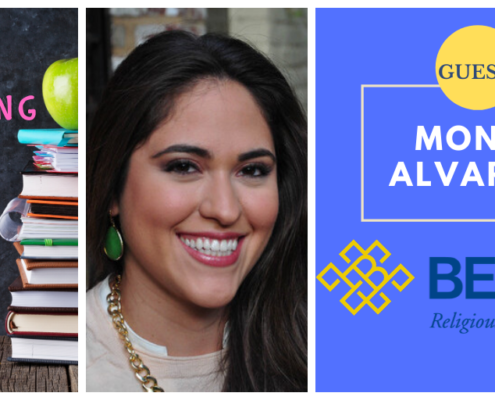
Montse Alvarado on Protecting Religious Liberty in Schools & Society
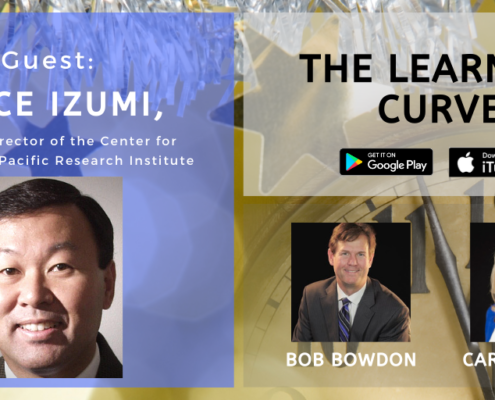
Lance Izumi on How Charters Are Meeting Diverse Learning Needs
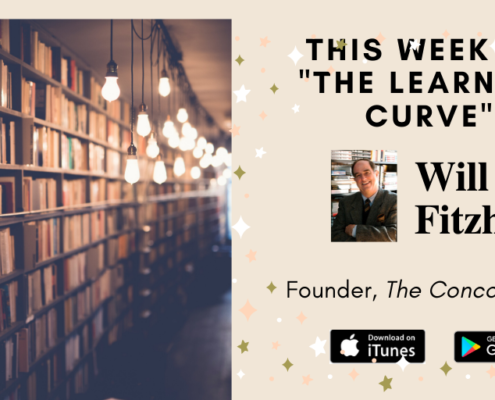
Will Fitzhugh on the Enduring Relevance of History Research & Writing
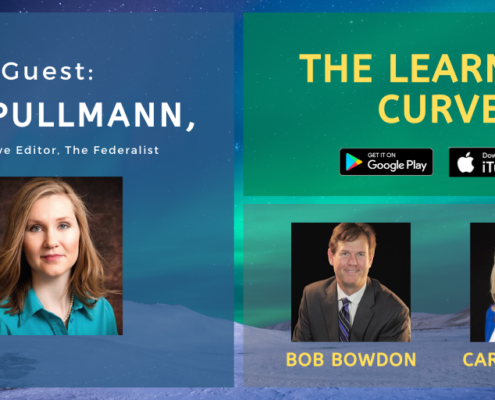
Joy Pullmann on the Fallout from Common Core
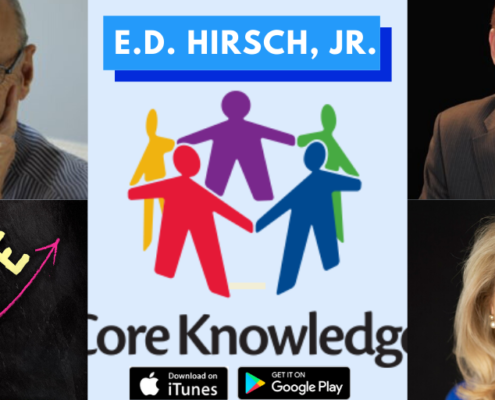
This Week on The Learning Curve: E.D. Hirsch, Jr. on Background Knowledge & Educational Equity
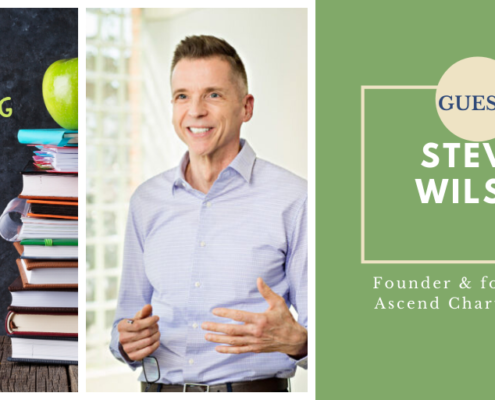
Steven Wilson on Anti-Intellectualism in K-12 Education
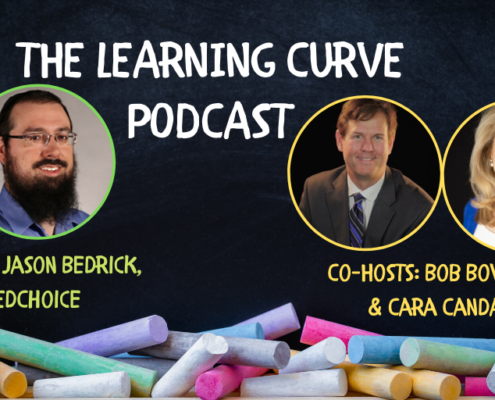
Jason Bedrick on Religious Freedom & Private School Autonomy

Dr. Lindsey Burke on LBJ’s True Education Legacy
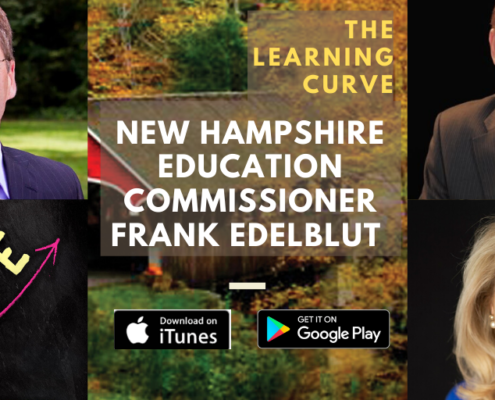
NH Education Commissioner Frank Edelblut on State-Driven K-12 Reform
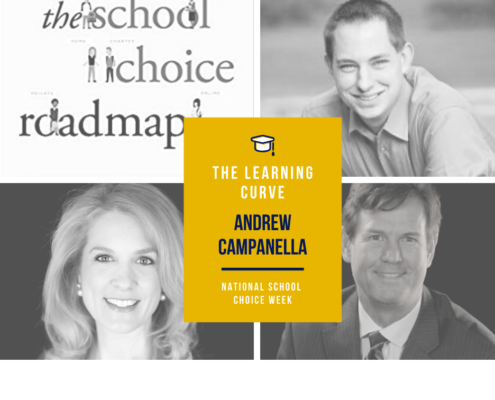
The Learning Curve: Andrew Campanella, President of National School Choice Week
